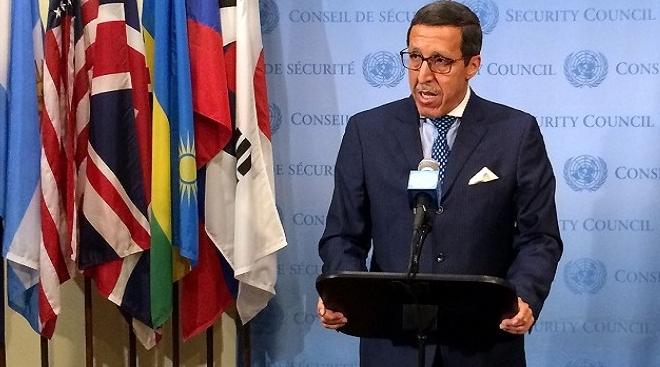Morocco Denounces to UNSG, Security Council Misuse of Decisions of AU Extraordinary Summit by South Africa
New York (United Nations) – Ambassador, Permanent Representative of Morocco to the UN, Omar Hilale, on Tuesday sent a letter to the UN Secretary General and to the President and members of the Security Council, in which he denounced the maneuvers of South Africa on the Moroccan Sahara issue.
The letter from the Ambassador of Morocco takes place following the correspondence that the Ambassador, Permanent Representative of South Africa, had sent on December 29, 2020, to the Secretary-General of the United Nations, conveying to him what he called “the decisions of the fourteenth extraordinary session of the Assembly of the African Union, on the theme + Silencing the Guns +, including a decision on the Western Sahara issue”.
In his letter, Ambassador Hilale pointed out that the South African missive misleadingly suggests that the African Union Extraordinary Summit on “Silencing the Guns” was exclusively dedicated to the Moroccan Sahara, issue indicating that the reality is totally different, and that the South African approach to singling out the the Moroccan Sahara issue reveals a double attempt, at the procedural and substantive levels, to mislead the Secretary-General of the United Nations and the Security Council.
Thus, on a procedural level, the Moroccan diplomat explained that the decision and the declaration of the 14th Extraordinary Summit of the African Union on “Silencing the Guns” consist of 57 paragraphs. However, the Moroccan Sahara issue is only addressed in a single paragraph, he said, adding that the language of the paragraph on the Moroccan Sahara issue is declaratory in nature, and in no way operational.
At the substantive level, Ambassador Hilale clarified that South Africa has knowingly ignored the threats and conflicts that hamper the development of the African continent, the bold policies and structural economic advances, such as the African Continental Free Trade Area, yet discussed during the Extraordinary Summit and included in its decision and declaration.
The Ambassador of Morocco said that South Africa’s unacknowledged goal is to focus the attention of the Secretary-General and the Security Council on one issue among the 40 or so topics raised during this Summit at the expense of the great concerns, expectations and hopes of the continent.
Furthermore, he noted that decision 693, adopted by the African Summit in Nouakchott (July 1-2, 2018), clearly recognized that the Moroccan Sahara issue is the exclusive responsibility of the United Nations, stressing that this decision established the African Union Troika Mechanism, whose role is limited to “providing effective support to the efforts of the United Nations”.
The Moroccan diplomat expressed Morocco’s deep regret that South Africa, which holds the presidency of the African Union, and that of the Security Council, at the time of sending his letter, had departed from the neutrality imposed on it by its functions by particularizing the the Moroccan Sahara issue, and by sacrificing the global challenges of Africa.
The ambassador also regretted that South Africa is instrumentalising the African Union and deviating its decisions and declarations, in favor of its ideological-political agenda, which the historical, political and legal realities of the Moroccanness of the Sahara blatantly contradict.
He added that the overwhelming majority of African Union member states do not share South Africa’s position on the Moroccan Sahara issue, which is completely out of step with successive Security Council resolutions.
Hilale reaffirmed Morocco’s attachment to the exclusively UN process, in order to achieve a political, realistic, pragmatic, lasting and compromise-based solution to the Moroccan Sahara issue, in accordance with the resolutions of the Security Council, which enshrined the preeminence, seriousness and credibility of the Moroccan Autonomy Initiative.
The Moroccan diplomat concluded that this Initiative is and will remain the only solution to this regional dispute, within the framework of the sovereignty and territorial integrity of the Kingdom of Morocco.
The letter sent by Morocco will be published as an official document of the Security Council and recorded in the annals of the United Nations.

